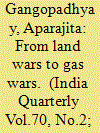| Srl | Item |
| 1 |
ID:
089398


|
|
|
|
|
| Publication |
2009.
|
| Summary/Abstract |
This study examines civic solidarity in Hong Kong and Taiwan at key democratic moments. Using political cartoons published during the 1995 LegCo election campaign in Hong Kong and the 2000 presidential election campaign in Taiwan, our findings indicate that the cultural codes of liberty, though not typically considered part of traditional Chinese values, have become the dominant cultural source for discourse in civil society. Values of caring and state paternalism, which resemble subsets of Confucian values, exist as competing, alternate cultural codes. In Taiwan, politically-divided members of civil society appear to share the same cultural language, thereby fostering a basis for mutual engagement. Nevertheless, little mutual engagement is actually found among politically divergent discourses. In Hong Kong, even a shared cultural language cannot be documented. The conclusion discusses the broader implications of these findings for the inclusive potential of civic discourses, amidst competing identity claims, in Hong Kong and Taiwan.
|
|
|
|
|
|
|
|
|
|
|
|
|
|
|
|
| 2 |
ID:
132306


|
|
|
|
|
| Publication |
2014.
|
| Summary/Abstract |
Chile and Bolivia have been intertwined in a complex relationship of hostility and cooperation for over a century. Since the Bolivian defeat in the War of the Pacific and the Treaty of Peace and Friendship of 1904, issues of resource sharing and Bolivia's sovereign access to sea on the Pacific side have altered the dynamics of such a relationship. Indeed, they appear to be the major stumbling blocs to attempts at normalisation of relations between the two Andean neighbours. In the recent years, Chile-Bolivia relations have been strained over the issue of gas. Bolivia's political volatility over gas and Chile's refusal to discuss the issue of access to the sea were viewed as being part of the same quagmire of relations. However, despite disparities in development between the two countries, globalisation has altered the context of mutual engagement. Against this backdrop, the article specifically looks at one such contemporary issue of bilateral contestation, that is, the gas issue. The article will examine its geo-economic significance in the larger context of regional cooperation and energy security. It intends to probe the plausibility of the argument that the gas issue has the promise and potential to lighten the sedimented antagonism between the two.
|
|
|
|
|
|
|
|
|
|
|
|
|
|
|
|